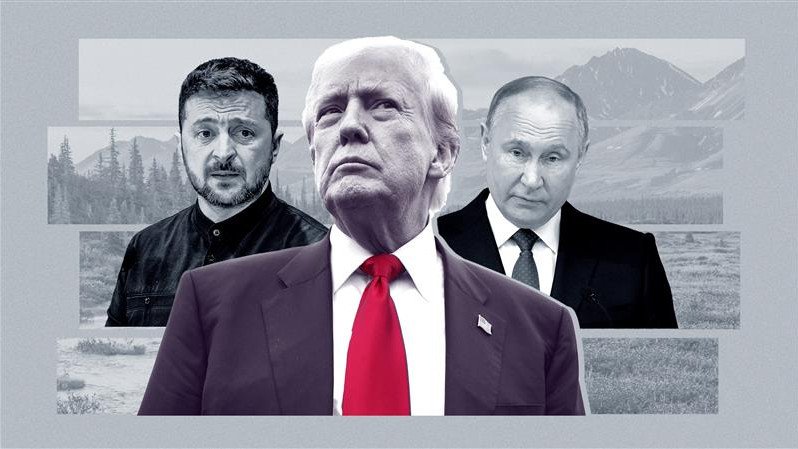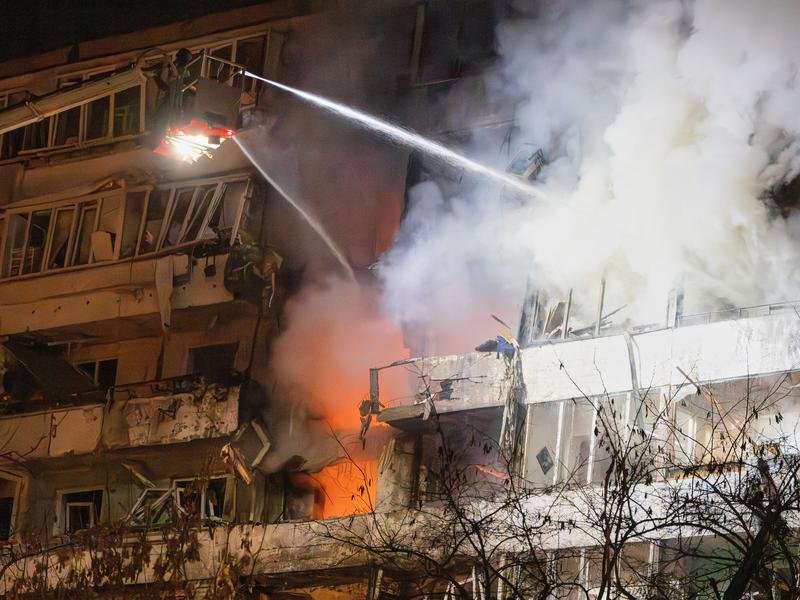Ukraine-Russia peace deal: Trump pushes Zelensky and Putin on ending war, but key issues are unresolved
Russian President Vladimir Putin has said the earlier US plan, which Ukraine saw as too pro-Russian, should be the basis for talks and is unlikely to back down.

President Donald Trump declared optimism on Tuesday that negotiations to end Russia’s war in Ukraine were making progress, saying there were “only a few remaining points of disagreement” after a week of breakneck talks, but he said he would meet with the leaders of the warring countries only once they were in the final phases of a deal.
The decision to push off a meeting with Ukrainian President Volodymyr Zelensky dashed Kyiv’s hopes that the Ukrainian leader could use a one-on-one meeting with Mr Trump in the coming days to reset the dynamic of negotiations that many Ukrainians feel have been tipped in Moscow’s favour. A senior Ukrainian official said earlier Tuesday that Mr Zelensky hoped to meet Mr Trump as soon as the Thanksgiving weekend.
Mr Trump’s declaration appeared aimed at spurring both sides into compromise even as the trickiest details of a deal remained unresolved. Ukrainians have said that only Mr Zelensky is empowered to resolve questions about whether to surrender additional Ukrainian territory to Russia, a key Russian demand that remains politically toxic in Ukraine.
Sign up to The Nightly's newsletters.
Get the first look at the digital newspaper, curated daily stories and breaking headlines delivered to your inbox.
By continuing you agree to our Terms and Privacy Policy.Mr Trump said he was dispatching special envoy Steve Witkoff to Moscow to meet with Russian President Vladimir Putin while Army Secretary Dan Driscoll will continue to meet with Ukrainians.
“I look forward to hopefully meeting with President Zelenskyy and President Putin soon, but ONLY when the deal to end this War is FINAL or, in its final stages,” Mr Trump wrote on his social media account.
It was the latest twist in a rushed negotiation that initially hinged on Ukrainian leaders agreeing to a 28-point plan that was politically unacceptable to them by Thanksgiving or facing the prospect of a cut-off in US intelligence sharing and weapons sales. MrTrump said the US team has made “tremendous progress” over the past week in the service of a deal, adding that the initial US proposal “has been fine-tuned.”
Momentum had been picking up over the US-led negotiations, with progress made over the weekend in Geneva and new meetings involving the United States, Russian and Ukrainian delegations in the United Arab Emirates.
All these negotiations may be for nothing, however, as the work to make the 28-point US plan more acceptable to Ukraine is precisely what will doom it with Russia, some analysts say.
Russian Foreign Minister Sergei Lavrov said he expected the Americans to soon present to Russia their interim version of the deal following input from the Ukrainians and Europeans. But he warned that if it strayed from what Mr Putin demanded in August when he met Mr Trump in Alaska, there would be a problem.
“Because if the spirit and letter of the Anchorage agreement are erased, based on the key understandings contained therein, then, of course, we’ll be in a fundamentally different situation,” he said.
The work to come up with a peace plan that would somehow be acceptable to all sides and end nearly four years of war came as dozens of Russian missiles slammed into Kyiv overnight, hitting apartment buildings and power infrastructure.
Lieutenant-Colonel Jeff Tolbert, a spokesman for Mr Driscoll, said the talks continuing through Tuesday with the Russian delegation in Abu Dhabi “are going well and we remain optimistic.” He added they were synchronized with the White House.
A Ukrainian delegation is also in Abu Dhabi, a US official said, “and has been in contact with Secretary Driscoll and his team.” He, like others interviewed, spoke on the condition of anonymity because of the sensitivity of the issue.
Rustem Umerov, the secretary of Ukraine’s National Security and Defence Council, initially said Tuesday that Mr Zelensky would be headed to the US to finalize the deal with Mr Trump this month. Mr Trump’s announcement appeared to throw cold water on that hope.
The original plan, which was widely criticised by the Ukrainians and Europeans as being too pro-Russian and a capitulation for Ukraine, was endorsed Friday by Mr Putin as a possible basis for peace. Most analysts think the latest changes will be unacceptable to Moscow, leaving Russia with the choice of trying to revise the draft deal once more or rejecting it outright.
The latest flurry of chaotic, pre-Thanksgiving US diplomacy aimed at ending the war could in the end fizzle, just as previous efforts have.
In his comments to the Russian Security Council on Friday, Mr Putin declared that Russia was “happy” to fight on and defeat Ukraine through military means. “But, as I’ve said many times before, we’re also ready for peace talks and peaceful resolution of problems.”
As US officials scrambled to try to bring the sides closer, Russia launched a punishing missile and drone attack against the Ukrainian capital overnight, striking residential apartment buildings in several neighbourhoods and killing at least seven people, the latest in a series of attacks on civilian infrastructure that seem designed to increase the pressure on Ukraine’s civilian population to break the nation’s resistance. Russia also targeted several other regions, including Chernihiv, Dnipro and Kharkiv.

The Russian bombardment led some senior European leaders to declare their scepticism that the Kremlin is interested in an end to the war.
“On the ground, the reality is the exact opposite of any genuine desire for peace,” French President Emmanuel Macron told reporters after a meeting of leaders of many of the countries that back Ukraine, along with Mr Zelensky and Secretary of State Marco Rubio.
Mr Macron said that while Europeans supported peace, “several participants in our meeting also reported on their own direct exchanges with the Russians, including with President Putin. It is now clear that Russia has no intention of agreeing to a ceasefire.”
A former senior Kremlin official with knowledge of the talks said that the original 28-point plan was just a “starting point” for Russia, with some elements acceptable to Moscow and others not.
“Putin also thinks that no one is taking his position seriously. Putin does not really want to continue the war, but he’s an opportunist. He really has to receive something meaningful in return for this war,” the former official said, dismissing Ukrainian and European efforts to shape the process.
“It’s a pro-Russian plan, but Russia is in a stronger position, so any plan would have to be pro-Russian because this is more realistic,” the former official said.
Russia has consistently criticised any European input into negotiations, insisting that the European nations are warmongers only seeking to perpetuate the war with their support of Ukraine.
Red lines for Russia in the negotiations include the move reported earlier by The Washington Post to, for now, put aside Moscow’s contentious demand that Ukraine withdraw from territory in the eastern Donbas region that Russia has failed to conquer, and instead for this to be decided in talks between Mr Trump and Mr Zelensky. Russia would also reject the call for Ukraine’s NATO aspirations to be decided based on NATO’s rules that would nix the outright veto on membership from the earlier draft.
In the Sunday talks, Ukrainian negotiators told their US counterparts that Kyiv would willing to start discussions from its current military positions, not on Russian demands that Ukraine surrender the portion of the Donetsk region it does not control, as stipulated in the earlier draft of the deal.
The former senior Kremlin official said Russia may be willing to freeze the front lines in the Zaporizhzhia and Kherson regions. “But the most complicated piece is Donetsk. I think compromise on Donetsk would be possible, but only at the end of the negotiations.”
The US negotiators are aware of the sensitivity of territorial concessions for the Ukrainians, said Oleksandr Bevz, a Ukrainian government adviser who participated in the Geneva talks, and realize that such questions could stir social unrest or military protests in Ukraine.
Tatiana Stanovaya, a senior fellow at the Carnegie Russia Eurasia Center, described the original 28-point plan as no more than an expanded version of the proposal Russia handed to special envoy Steve Witkoff when he visited Putin at the Kremlin in April - a plan that then, as now, was swiftly rejected by Ukraine and Europe.
Mr Trump said Tuesday that the plan had been drafted by the United States.
“From Moscow’s point of view, little has changed since April, apart from the fact that Ukraine’s position has worsened,” Ms Stanovaya said. When Mr Putin said the plan could be a basis of discussions, it was clearly with the idea of making it still more favourable to Russia, she said.
But even that plan was not good enough from Moscow’s perspective, said a Russian academic close to senior Russian diplomats, since the Kremlin has long insisted on dismantling Zelensky’s government and its military might.
Ukrainians “are not making any concessions. They are just going to rebuild their forces and they will be supplied by the European defense sector, and then when they’ve collected their strength, they will continue the war. At least this is how many experts around the Russian leadership see it,” the academic said.
Over the past year of peace initiatives, both the Russians and the Ukrainians have been at pains to avoid appearing to Mr Trump as any kind of obstacle to peace.
“It’s important for Putin not to lose Trump,” the academic said. “And I think he would not like Russia to be seen by Trump as the main obstacle to peace. Therefore, he is ready to show some kind of flexibility. But on what scale and in what areas we don’t know yet.”
Mr Putin’s final position is likely to hinge on his view of Russia’s “reserves of stability” under the growing weight of sanctions, he said. “If he considers that problems are building up and next year will be more difficult, this could be a stimulus to take a more flexible position,” he said.
© 2025 , The Washington Post
